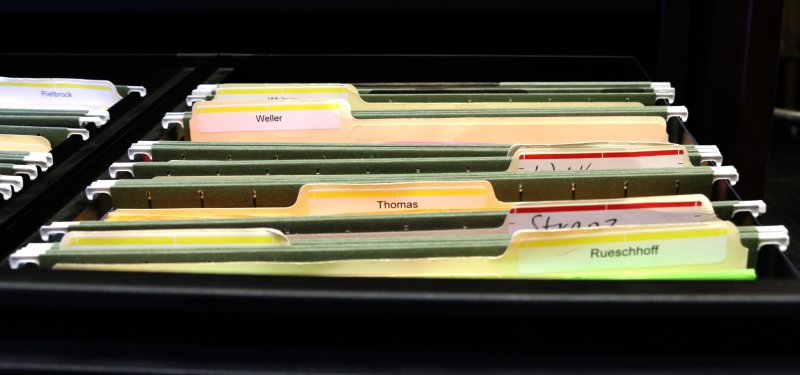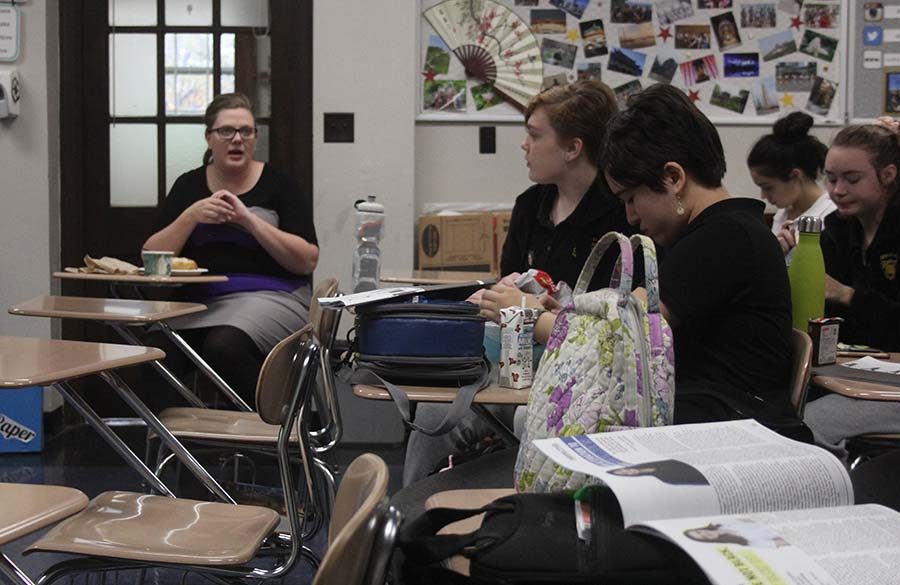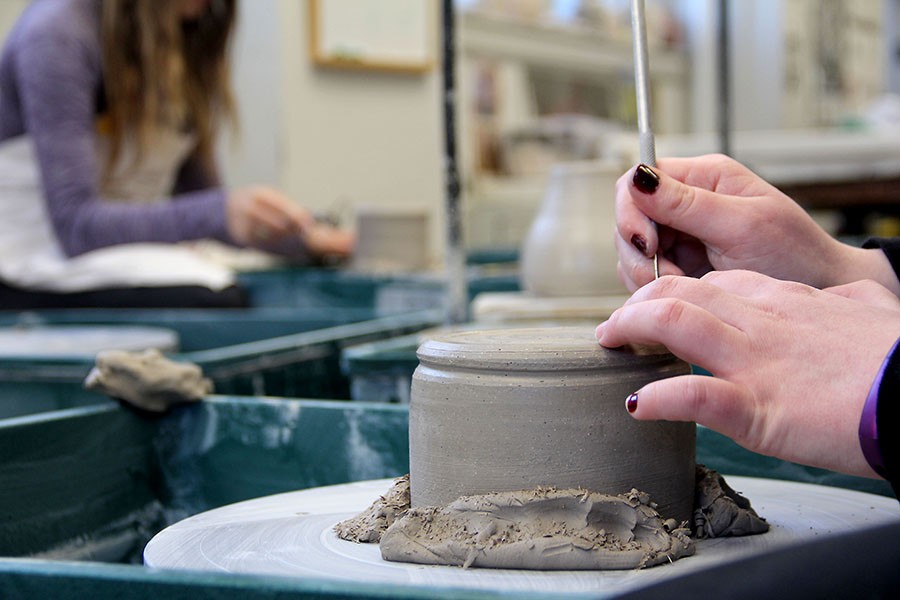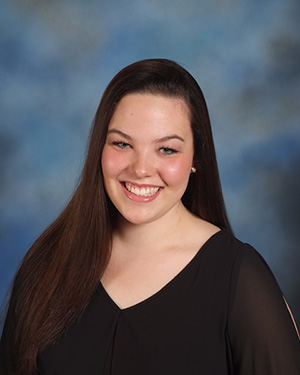story by Katie Parkinson and Lauren Langdon, photos by Anna Leach
Some students groan and complain about them. Some lose them and have to track them down. Some are religious about keeping them in the same place every day.
Every girl who has attended STA is familiar with accountabilities – a system unique to the school that is designed to help students become more accountable for their choices, actions and behaviors. Accountabilties are part of the everyday routine at the academy. They are so common that few students give them any thought beyond wondering where theirs is and remembering to get them stamped.
But how did we get accountabilities in the first place, and why do we need them?
The System
On the accountability system, freshmen and sophomores are required to be “stamped” by a teacher or faculty member for frees and activity periods. Teachers have individualized stamps with their signature that they use to prove a student has been where they said they were.
Although there are no rules in the student handbook explicating this procedure, it is something that every incoming freshman quickly becomes familiar with.
According to principal of academic affairs Barb McCormick, accountabilities serve two main purposes: to help guide students in utilizing unstructured time and to simply know where students are.
“You are in our care from 7:50 a.m. until 3 p.m,” McCormick said. “If we don’t know where you are, or you were not on the premise when something happened, and we were notifying parents, it’s a liability. So there’s a safety factor involved.”
However, as students get older, the administration believes they can handle more responsibility. Juniors can go on “blue sheet,” a smaller version of accountabilities that requires them to be stamped only for activity periods, and seniors do not have to be stamped at all.
This only changes if a junior or senior student “accumulates two behavior reports for being-off limits,” according to the teacher’s handbook, in which case the student moves to 100 percent accountability for two weeks. If the student continues to be off-limits, “additional accountability will be required.”
“[Seniors are] more responsible, so they should be held more accountable for their own uses,” McCormick said. “We feel as if we do not need to be micromanaging them or guiding them as much. We feel like we’ve acclimated them to what’s expected here over the first couple years, and as long as they haven’t broken any rules, we should be able to let them have that responsibility themselves.”
After students have all the necessary stamps for the week, they turn them into their advisers on a weekly or bi-weekly basis. Advisers then collect them and turn them in to administrative assistant Kelly Drummond who files them in a cabinet by advisory were they are kept for the current semester.
“[Principal of student affairs, Mary Anne Hoecker] is the one who oversees the accountabilities,” Drummond said. “If there are any questions about them, for instance if someone is looking to see where students were on a particular day when they were supposed to be taking a test in a free or something like that, she can just look at their old accountability sheet.”
According to Hoecker, she usually only has to do this about once a year at most.
For the second half of the year, the first semester accountabilities are moved to storage in the M&A building to make room for the new accountabilities.
At the end of every school year, that year’s accountabilities are recycled sometime over the summer.
[nggallery id=712]
History
According to Hoecker, more than 40 years ago accountabilities were non-existent. Students still had unstructured free periods, but instead of having the option to go to open classrooms, everyone went down to the commons.
“What happened was they weren’t studying,” Hoecker said. “It was a free for all, and we thought, ‘That’s not helping.’”
As the commons became a noisy, chaotic, social area, the administration decided to implement the accountability system. Under this version though, everyone (including seniors) was required to be stamped for frees and activities.
About 15 years later, seniors approached the administration asking to be taken off accountabilities as long as they had no SBRs, and the administration agreed.
“There was a discussion about how we wanted students to be accountable themselves, so we decided to try this,” Hoecker said.
At the same time, the administration also decided to let juniors go to blue sheet, and the system transformed into the one that is in place today.
Current attitudes
Because accountabilities are unique to STA, incoming freshman are often confused about them at first, according to McCormick.
“I don’t think they purposely misplace [accountabilities] or forget to get them stamped,” McCormick said. “I believe they’re still learning, and most students figure out, ‘This process is pretty simple. If I do it for a couple years, I get the rights to be self-responsible.’”
According to freshman Marin Brown, she understands the reason for accountabilities, but doesn’t think much about them and has only had problems losing or forgetting her accountability once.
“I freaked out because it was my first time freshman year, and I thought I was going to die,” Brown said. “I just got a stamp later that week because I go to [Montag’s] room a lot for activities and frees. So, it was good.”
Senior Katherine Becker, who transferred from Pembroke Hill High School, said the whole system seemed “kind of silly and trivial because I couldn’t imagine going anywhere else than a classroom in the first place.”
According to Becker, at Pembroke, sophomores, juniors and seniors are allowed to go outside and to open classrooms for study halls.
“We would treat [the privilege] with respect, and there weren’t any problems that I knew of,” Becker said.
Similarly, junior Amelia Lester, who transferred from Notre Dame de Sion High School, was not enthusiastic about the new system.
“I get why they are important, and I like that I can go wherever I want as long as I have it, but it’s kind of annoying,” Lester said. “I forget to get it stamped, and it’s a hassle to track down those teachers.”
Despite students’ opinions, many teachers agree that accountabilities are important and effective, although they may handle them in slightly different ways.
For instance, at the end of the week, adviser Diana Blessen gives students the opportunity to get any missing stamps and turn in their accountabilities on Monday. If they don’t, then they get an SBR.
When students come back to her for stamps from previous frees, Blessen usually has no problem stamping them because she knows whether or not they were in her room.
“Sometimes I have no clue who’s in my room, but I don’t think they would be coming in to get [the stamp] if they weren’t here,” Blessen said. “I’d say 99 percent of the time I know if they’ve been there or not. I’m aware of who’s in my room because those girls are my responsibility at that time.”
Advisers Mary Montag and Alice Amick take a similar approach to accountabilities. Montag gives her advisees one pass to forget.
“Everybody is allowed, ‘Oh, I forgot it at home’ but then give it to me on Monday because everybody does that,” Montag said. “Everybody needs one, and I always tell them that upfront during orientation.”
Amick gives students with missing stamps that they are unable to go back and get are subject to detention the first time. When it becomes a continuing occurrence, Amick gives out SBRs.
“I can see the point, having a legal background, that we need to know where students are, especially if something bad should happen,” Amick said. “I also think it teaches some level of personal responsibility, and I see the benefit in that, but I also see that there are loopholes, and [the system] is not perfect.”
Blessen agreed, saying, “Accountabilities drive me crazy, but I can’t think of a better way to do it.”
In the Future
According to Hoecker, the accountability system will probably stay unmodified in the coming years.
Montag said it was a good system and that dishonesty and forgery with accountabilities is generally not an issue.
“I would say that most students are pretty accurate about it,” adviser Craig Whitney said. “I have seen instances where clearly students have gone to someone and had a number of their days stamped, and it’s maybe not even unlikely that they were around and didn’t get it stamped and then went back and got a number of days stamped because they had actually been there. I think generally students are pretty good.”
Montag agreed, saying that the system allows teachers to help students in many different ways.
While Whitney admitted that, “like all things there probably could be a better alternative,” overall he said he is satisfied with the process.









